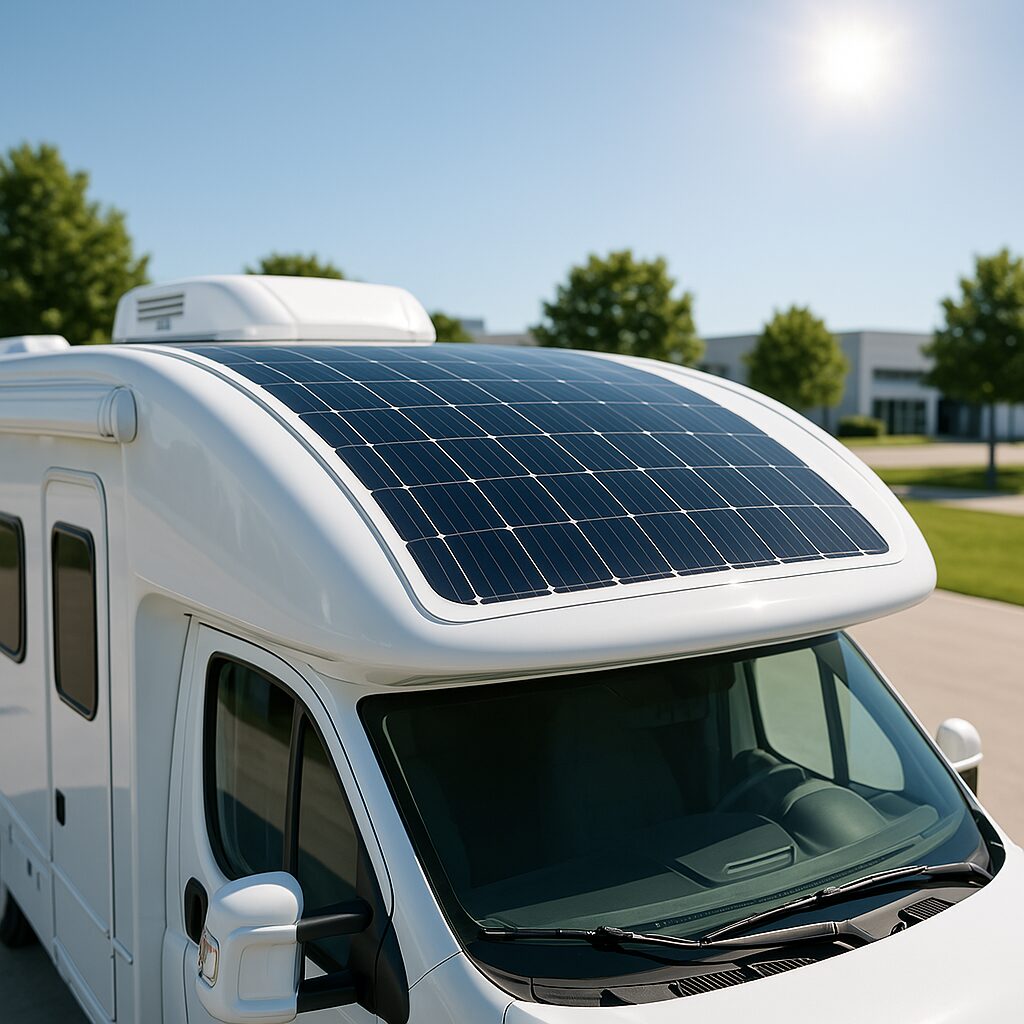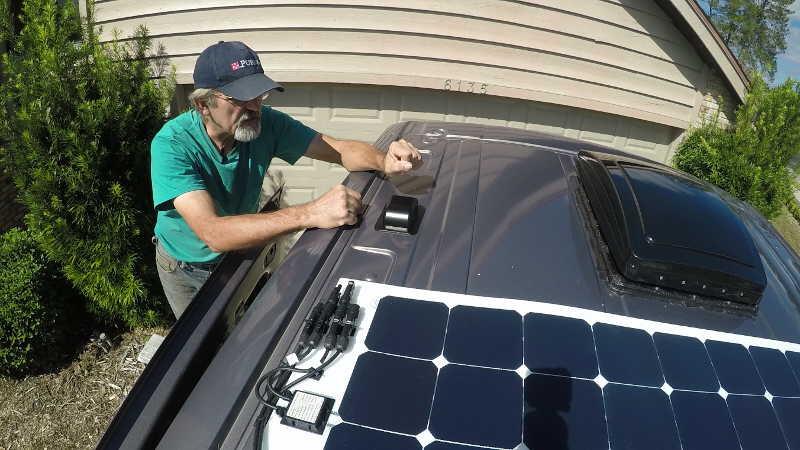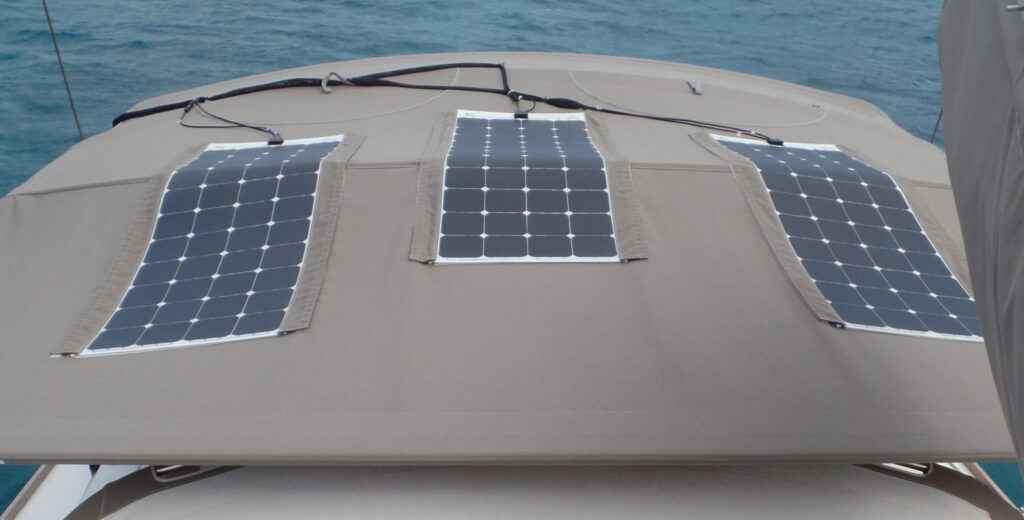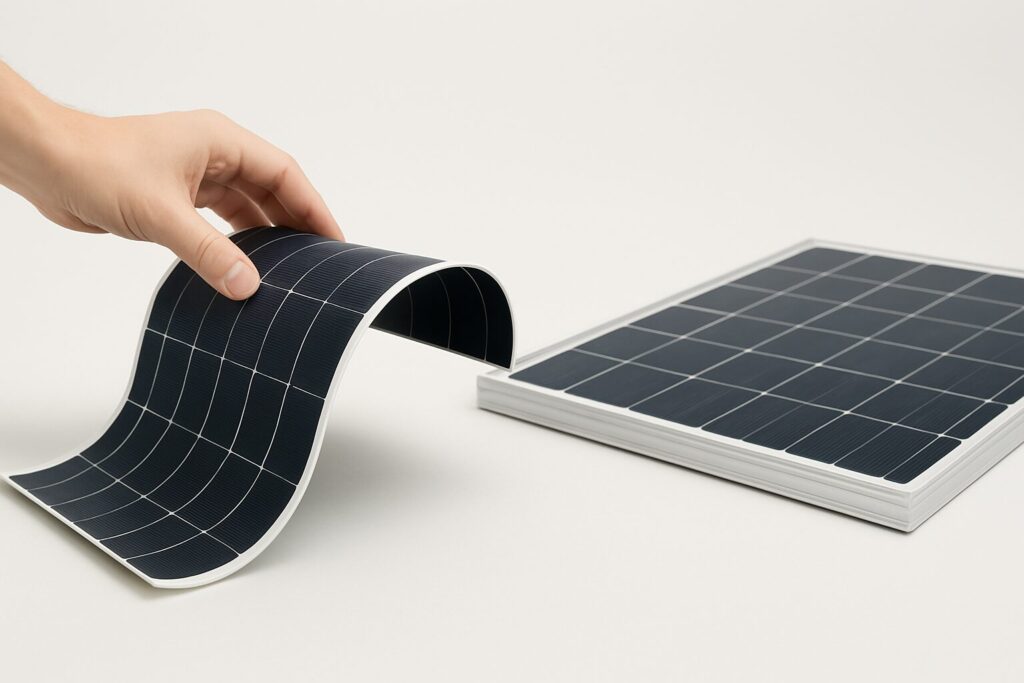Phone:
(701)814-6992
Physical address:
6296 Donnelly Plaza
Ratkeville, Bahamas.

Bendable solar panels offer the flexibility to be installed on surfaces where traditional panels can’t go. In this article, we’ll explain what makes them unique, how they work, and their key benefits.

Flexible solar panels are distinguished by their adaptability and construction materials, setting them apart from conventional rigid solar panels that utilize silicon wafers. These bendable panels can be crafted using various substances such as perovskite and organic solar cells, with amorphous silicon, copper indium gallium selenide (CIGS), cadmium telluride (CdTe), and gallium arsenide among the most common. They’re layered onto pliant backings like plastic or metal foils—or even thin glass—boosting both durability and portability.
The flexibility intrinsic to these panels is a result of thin film technology where flexible solar cells are deposited in slender layers. Such architecture not only lends these panels their lightweight nature, but also permits incorporating cutting-edge elements such as carbon nanotubes and graphene, which offer suppleness without compromising structural integrity. Consequently, this generates multipurpose thin film solar products capable of being contorted or wrapped around different shapes for an array of surfaces including portable foldable designs.
Bendable panel versatility extends across all kinds of existing solar technologies, enhancing compatibility for multiple applications – they’re often referred to as “thin-film” given their featherweight form factor coupled with broad usability potential.
Yet despite these innovative features provided by the latest advancements in flexible photovoltaic design. It’s crucial to recognize that they usually lag behind traditional rigid models when it comes to energy efficiency levels while offering reduced longevity compared to standard hard-surfaced options.

Bendable solar panels stand out for their broad applicability thanks to their flexible and featherweight construction, which allows them to be affixed onto a variety of surfaces that may be curved or delicate, unlike traditional rigid solar panels. Their design is especially beneficial for mobile applications such as use in recreational vehicles (RVs), boats, and during outdoor adventures.
Compared to conventional rigid panels, these bendable versions present an array of attachment possibilities including the use of adhesives, Velcro strips, and straightforward do-it-yourself methods. Examining their specific roles within RVs and campers, maritime settings, and open-air activities can illuminate how they contribute to greater self-sufficiency with respect to energy needs while also providing added ease.

Flexible solar panels represent a significant advancement for avid travelers. Their lightweight nature and straightforward setup are perfectly suited for use on RVs and campers. In contrast to the more unwieldy traditional solar panels, which pose challenges when mounting on curved RV roofs, flexible panels easily adapt to these contoured surfaces.
Such versatility guarantees that you can generate energy even while traveling, offering power independent of conventional hookups and thus amplifying the autonomy of your journeys.
Bendable solar panels, which boast a waterproof and IP68 rating, are exceptionally suited for use in marine settings. They can be strategically placed on areas of the boat that were not previously used, thus maximizing spatial efficiency.
The design of these panels allows them to adapt to intricate mounting surfaces aboard the vessel, guaranteeing an ideal setup while continuously providing power to maintain battery levels essential for navigation and various electronic systems onboard.
The bendable solar panels present a significant benefit with their lightweight construction, which is ideal for those who love the outdoors. The flexible nature of these panels means they can be effortlessly affixed to different types of equipment like backpacks and tents, providing a mobile charging solution for electronic devices.
These solar panels serve as a handy and reliable power source during various outdoor pursuits such as camping or hiking, improving your adventure while helping you maintain connectivity.

Flexible solar panels present a range of benefits that render them highly appealing for diverse uses. They are particularly well-suited to atypical installation scenarios where conventional rigid solar panels cannot be feasibly used due to their inflexibility. These bendable panels boast a light construction which simplifies the process of carrying and mounting them, thus offering enhanced versatility in deployment.
Exploring distinct advantages such as their portability and lightweight characteristics, straightforward setup procedures, and compatibility with curved surfaces Underscores why flexible solar panels are experiencing increased favor within the solar industry.
Bendable solar panels offer the significant benefit of being both lightweight and easily portable. These flexible panels typically tip the scales at a mere 4 to 10 pounds, with some ultra-light models weighing just shy of four pounds. This is a substantial reduction compared to traditional rigid solar panels that often weigh approximately 20 pounds.
Their reduced weight and flexibility make these panels especially advantageous for use during activities such as camping or hiking where space conservation is crucial and lugging around heavy gear is not feasible.
Bendable solar panels offer the benefit of simple installation processes, setting them apart from traditional rigid panels which typically necessitate intricate mounting systems. These flexible panels can be effortlessly affixed through multiple techniques that cater to diverse conditions and substrates, such as using tape, securing with an adhesive bond or employing industrial silicone adhesive in place of screws.
Consequently, they present a superb option for individuals who enjoy do-it-yourself projects and those in pursuit of a fast and straightforward installation experience.
Flexible solar panels are highly versatile due to their ability to adapt to curved shapes, enabling them to fit onto surfaces where traditional rigid panels cannot. These panels have the remarkable capability of bending up to 240 degrees, offering considerable flexibility for diverse installation requirements.
These bendable solar panels showcase impressive durability as they can endure being stepped on without sustaining damage. This characteristic ensures that they are robust enough to tolerate a wide range of environmental conditions.
Prior to this:
Bendable solar panels provide a range of benefits, yet they are not without certain downsides. Among the main issues is that these panels yield less energy efficiency when juxtaposed with conventional rigid solar panels. Their durability tends to be reduced and they offer a more confined power output which may render them unsuitable for situations where large amounts of energy are required.
Subsequent to this:
Bendable solar panels present numerous advantages, but also carry specific drawbacks.
We will delve deeper into these challenges next: diminished efficiency levels, curtailed lifespans, and restricted power production capabilities from bendable solar panels—key points crucial in determining whether such types of solar modules align well with your needs or not.
Flexible solar panels Convert sunlight into electricity with less efficiency than their rigid counterparts. These flexible panels often work at an energy conversion rate ranging from 15 to 18 percent, whereas the sturdier and more traditional rigid solar panels can attain conversion efficiencies as high as 23 percent. The compromise in electrical output results from the thin-film design of flexible solar panels that is not as adept at transforming solar energy into usable electricity.
Taking the LINKSOLAR flexible panel as an example, it boasts a relatively modest efficiency rating of 17.3%.
Bendable solar panels are associated with a more limited durability, lasting only about 5 to 15 years.
The longevity of these flexible panels is heavily impacted by variables including how often they’re used and the environmental conditions they face.
Flexible solar panels typically generate a wattage between 50 and 300 watts, which is less than the power produced by rigid panels. This reduction in power output renders them less capable of meeting significant energy requirements. Due to their lower power generation, they are more suitable for portable applications and minor energy demands.
The price of flexible solar panels can vary widely depending on their wattage, the brand offering them, and their overall quality. it’s possible to purchase a 200W flexible solar panel for approximately $289.99 when it is on sale, presenting an accessible and efficient option for those in search of budget-friendly solar power solutions.
This range in pricing along with the distinct advantages that come with using flexible panels renders the investment into bendable solar technology a practical choice for various uses including recreational activities or as an auxiliary power supply source.
Bendable solar panels provide a distinctive combination of adaptability, portability, and simple setup which makes them ideal for numerous uses including recreational vehicles (RVs), boating, and outdoor activities. Despite having certain drawbacks such as reduced efficiency and a lesser lifespan, despite having certain drawbacks such as reduced efficiency. To conventional rigid solar panels, their benefits tend to surpass these limitations for particular applications. The expanding market for flexible solar panels highlights their potential as an attractive and practical solution for capturing solar energy in creative manners.
Contact us to get more information about flexible solar panel
Bendable solar panels are primarily made from amorphous silicon, copper indium gallium selenide, cadmium telluride, gallium arsenide, perovskite, and organic solar cells.These materials provide flexibility and efficiency for various applications.
Bendable solar panels generally last between 5 to 15 years, which is shorter than conventional rigid panels.
Therefore, if you’re considering them, it’s essential to factor in this lifespan when making your decision.
Bendable solar panels typically have lower efficiency, ranging from 15-18%, compared to rigid panels, which can reach up to 23%.
Therefore, for higher efficiency, rigid panels are the better choice.
Flexible solar panels are designed to be waterproof and typically come with an IP68 rating, ensuring they can withstand marine environments while maintaining their durability and functionality in moist conditions.
Flexible solar panels usually range in price from $100 to $600, and those of superior quality tend to average around $200. This affordability and adaptability make them an excellent option for a multitude of uses.